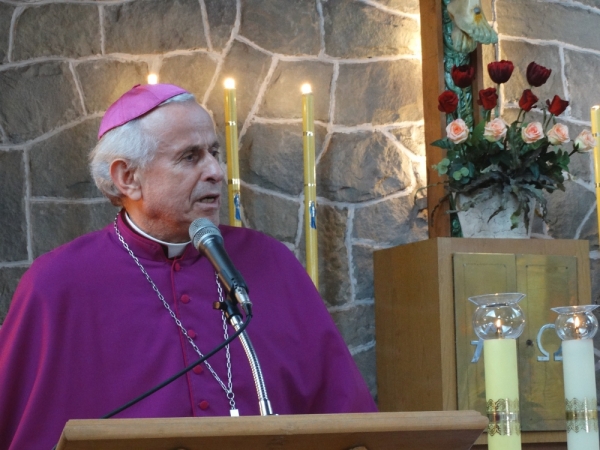Together with the Old Catholic Church in Poland, we mourn the death of Bishop Wiktor Wysoczański, who passed away on 27 April 2023. Although he was already 84 years old, he was still the Presiding Bishop of the Polish Catholic Church. Bishop Wiktor was an inspiring constant in the Union of Utrecht, for many a father in Christ with whom it was fascinating to associate. He uniquely held the lines together in his own Church. In this it is not easy to follow him. But Christ is faithful to His Church and we ask Him for strength for all believers in our Polish sister Church. May God strengthen them in these days of sorrow and give them insight into the times ahead.
Wiktor was born on 24 March 1939 into a Roman Catholic family in Verkhnie Vysotske, which was then in the eastern border region of the Second Polish Republic, now in Ukraine. After graduating from high school, he and many other Poles were expelled from the Ukrainian SSR by the Soviets. Once in Poland, Wiktor became an Old Catholic after studying for a year at a Roman Catholic seminary. He committed himself heart and soul to his new church and mastered the Old Catholic approach to theologising. He studied theology at the Christian Theological Academy in Warsaw and at the University of Bern, as well as law in Torún and Warsaw.
On Candlemas, 2 February 1963, he was ordained a priest in Warsaw by Bishop Maximilian Rode and subsequently worked as a pastor in four parishes. Elected bishop in 1975, he could only be consecrated bishop in June 1983 by the then Archbishop of Utrecht, Marinus Kok – thus narrowly missing his 40th anniversary in office. On 27 June 1995, the Synod elected him as the ‘first bishop’ of the Polish Catholic Church, succeeding Tadeusz Majewski. When the other two bishop’s seats in his church (Wrocław and Kraków) became vacant, he was the only one left. Attempts to elect new bishops have unfortunately always failed at successive synods, as no candidate achieved the required two-thirds majority.
Wysoczański taught ecumenism, history of Old Catholicism and canon law at the Christian Academy in Warsaw, of which he was also rector for two periods (1990-1996 and 2002-2008). He published several scholarly articles on his fields of expertise in the International Church Review (IKZ, Bern). He has held various ecumenical offices and was Vice-President of the Polish Ecumenical Council since 2011. At the Union of Utrecht he participated in the theological dialogue with the Orthodox Churches. He received an honorary doctorate from the University of Bern in 1999.
As the doyen of the International Old Catholic Bishops’ Conference of the Utrecht Union, Bishop Wiktor attached great importance to our cooperation and exchange. Also thanks to his leadership, the Polish Church remained in the Union of Utrecht. When other Old Catholic Churches opened the apostolic ministry to called women and the Polish National Church from the USA saw this as a break, the Churches of Poland and the Czech Republic noted that this decision was not church-dividing. According to Bishop Wiktor, it is important that we as local churches give each other support and space, even when things are difficult and we come to different views.
Although his health deteriorated significantly in recent years, Bishop Wiktor remained faithful to his Church and the International Bishops’ Conference until the end. The election synod for his successor has already been scheduled for 13 June in Konstancin.
I wish the Synodal Council of the Polish Catholic Church, Vicar General Andrzej Gontarek and all the clergy and faithful in Poland confidence in Christ in this time of sorrow. For all the members of the coming Synod, we pray in the Union of Utrecht that the wisdom of God may guide them as they prepare for their responsible decision.
Utrecht, 28 April 2023
+ Barend Theodoor Wallet
Archbishop of Utrecht
President of the IBC

